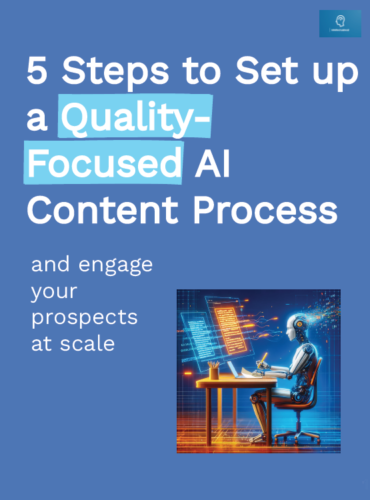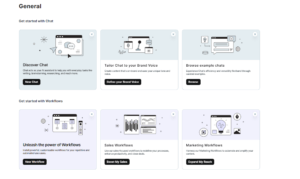It’s rare to get across a writer who is both talented and has industry experience.
If that’s the case, good for you. But for the rest of us marketers, there’s another option: SME content.
This type of content involves collecting the knowledge of your subject-matter experts and turning them into compelling writing.
Here’s how you can set up such a content creation process.
Why rely on your SMEs to create content?
As a content manager, you want to create content both authoritative and useful for your prospects and clients.
What’s the best way to deliver that? You’ve guessed it, subject-matter experts can be of huge help.
Thanks to first-hand experience and extensive knowledge of your industry, they can provide valuable insights for your readers’ business challenges.
These SMEs can be industry leaders, consultants, specialized experts, technical or product owners. What they have all in common is that they’ve cultivated a mastery of your customer’s daily practice or tools. They thus intuitively know how to help them.
By relying on their knowledge to create content, you can achieve some desirable outcomes :
- Increase brand preference and nurture your prospects with highly credible and authoritative content.
- Improve your Google ranking and generate more leads by complying with the E-E-A-T guideline (Experience, Expertise, Authority, and Trustworthiness).
Sounds compelling enough? Here are 7 steps to get an SME content creation process going.
Creating SME content: a 7-step process
#1 Convince your industry experts
It’s not the job of your in-house experts to create content. They have been hired to consult your customers, advise your product builders, and train your sales reps. Nevertheless, their core mission -making their company more knowledgeable – fits with your goal as a content manager. You both want to increase the authority of your company on a specific field of expertise.
Here’s what you can do to convince them to work with you:
- Establish contact: Start by getting in touch with the right business experts for your content topic. Get to know them, their interests, and their expertise.
- Sell the benefits: Highlight the benefits of their contribution to the company, such as enhancing authority and securing business opportunities. Also mention the benefits to their careers, such as building their personal branding by sharing their expertise.
- Involve managers: If your business experts have a manager, talk to them about this collaboration and how it can benefit the company. Get their support and agreement.
#2 Set up meetings
Your in-house experts are busy professionals. Their schedules don’t naturally include time dedicated to content creation. You need to agree on a defined meeting time to facilitate collaboration. Here’s what you can do :
- Schedule regular meetings: Plan 45-minute interview sessions every two weeks to discuss defined topics with your experts. This will be more than enough time to collect key information.
- Alternate between experts: To avoid overloading your SME, you might interview several experts. This will enrich your content and give you access to a wider range of expertise.
- Find the right time: To not distract your experts from their main tasks, choose time slots that fit naturally into their schedules. For example, offer 30-minute informal discussions during coffee breaks or lunches.
#3 Lead the conversation
When meeting with your experts, you want to maximize the value of the conversation. You want to collect the largest amount of material possible for your content. To achieve that, you can adopt the following best practices :
- Target relevant topics: During your meetings, address issues that are both crucial to your prospects and for which your experts have concrete experience. This will ensure the relevance and added value of your content.
- Let them express themselves: when interviewing your experts, use open-ended questions, avoid interrupting them, and encourage them to share their personal experiences.
- Be flexible: Although you can prepare questions beforehand, you want to be receptive to your experts’ answers and bounce back on them. This flexible approach allows you to explore new perspectives and delve deeper into key points.
- Record the conversation: Taking notes can make you miss some key points from the flow of the conversation. To make sure you don’t forget anything and to save time, you might record the conversation. Nothing more frustrating than realizing that you’ve forgotten something during the debriefing!
#4 Challenge their ideas
Your SMEs might often provide answers that seem obvious to them, but not to your average reader. They also might only address one aspect of a topic and lack a cohesive vision. Here’s what you need to do to get the most out of their insights:
- Challenge their perspective: Tell experts about the ideas of competing companies and ask them how they differ from their thinking. This will help you identify redundancies and areas that have not yet been addressed.
- Find a new angle: Agree with your experts on a main point of view on the subject, which will structure your arguments. This distinctive POV will make your publications more interesting and impactful.
- Rely on studies: Ask your experts to provide internal or external references to back up their arguments. Past studies, articles or projects can provide a stronger foundation for your content.
- Clarify all notions: Encourage your experts to clarify notions or concepts that seem obvious to them, but are often left out of existing literature. This will make your content more accessible and educational for your readers.
#5 Refine and edit the material
Now that you’ve got enough material, it’s time to turn it into engaging writing. Your words of your experts are full of insights, but they won’t grab the attention of your audience. Your job is to convey their ideas in the simplest and clearest way possible. You can follow these practices to ensure that :
- Start with the structure: Prepare an outline that covers every aspect of the topic (what, why, how much, etc.). This ensures you cover all your audience’s important questions and maximize the impact of your content.
- Rely on the transcription: Retrieve the transcript of your conversations and rearrange each idea based on your existing outline. This will give you a head start to build your paragraphs.
- Leverage generative AI: Use tools such as ChatGPT to help you summarize, structure, and formulate interesting paragraphs from your experts’ insights. Use prompts such as: “You’re a professional marketing writer of quality blog posts that speak to *your audience*. Based on my outline, your own database and the following ideas, can you write a paragraph on *your topic*?”
- Proofreading: Ask your experts to proofread your first draft to make sure it accurately reflects your ideas. Let them also check for any errors or inaccuracies. Share content via collaborative platforms to leave comments or suggestions. Give the expert a deadline for providing feedback, after which you will publish the content.
#6 Keep the collaboration alive
You’ve just successfully published your first SME content? It would be a shame not to grow your partnership and make it last. For that, you can :
- Express your gratitude: Thank your experts for their valuable contribution, and keep them informed of the publication and performance of your content. Showing them the impact their work makes will encourage them to do it again.
- Credit their contributions: Highlight your experts by crediting them in your content. It enhances the content’s authority and promotes your experts.
- Quote them in other formats: Use quotes from your experts to highlight them in different formats, such as LinkedIn posts, infographics, or videos. This reinforces their image of expertise and supports your multi-channel content strategy.
- Document your process: Establish an editorial calendar and document your creative process. This will help keep your team informed and better manage the distribution of your content across all channels and formats (social media, blog, videos, etc.).
You know now how to leverage the precious knowledge of your SMEs. Your turn to create memorable B2B content!





